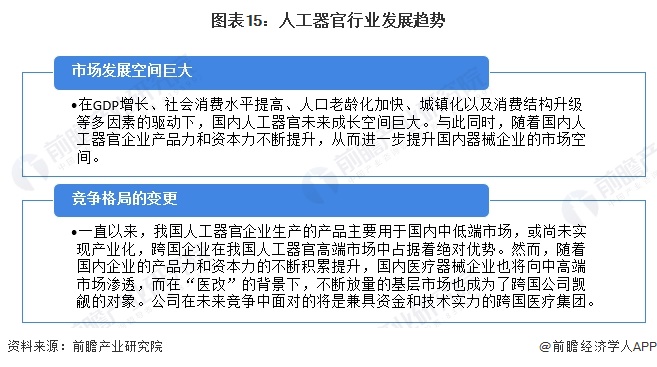Forecast 2024: "2024 China Artificial Organ Industry Panorama" (with market status, competition pattern and development trend, etc.)Core data: market status, competition pattern
Industry profile
1. Definition
Artificial organs are parts made of artificial materials that can partially or completely replace the functions of natural organs of the human body. It is a new discipline of biomedical engineering, which mainly studies the structure and function of human organs, and uses artificial materials and electronic technology to make mechanical devices and electronic devices that partially or completely replace the functions of human natural organs.
When a human organ is damaged and cannot be cured by conventional means, it is possible to give the patient an artificial organ to replace or partially replace the damaged natural organ, compensate or repair or assist its function. It is an artificial device that temporarily or permanently replaces the main functions of certain organs of the body.
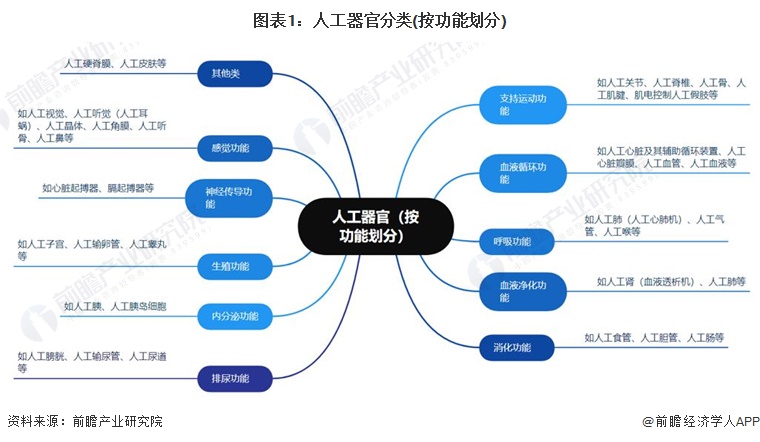
2, industry chain analysis: there are many participants in the industry chain
There are many artificial organ products, and the upstream raw materials of different products are different, mainly divided into biological materials, chemical materials, steel and non-ferrous metals and packaging materials; The middle reaches are mainly the manufacture of artificial organs. At present, the more famous ones are artificial heart, artificial liver, artificial kidney, artificial lens, artificial cochlear, artificial throat, etc. The downstream is mainly the sale and application of artificial organs, which are generally sold to various medical institutions through pharmaceutical circulation enterprises and are in need of patients.
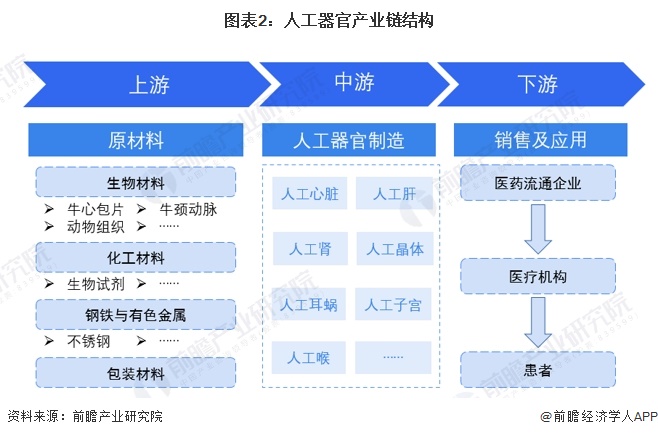
Among the participants in the artificial organ industry chain, the upstream biomaterial manufacturers include amino acid Baiyouda, Dongchao Biology, etc., chemical raw material manufacturers include Sinopharm Group, packaging material manufacturers, steel and non-ferrous metal manufacturers; The middle reaches of the field of artificial heart are represented by Bai Ren Medical, Qiming Medical, Minimally invasive Medical and Lepu Medical, etc., the artificial liver companies are represented by Tong Gan Medical, Weizhizhuo Biological, Ganhui biological, Celivi, etc., and the intraocular lens companies are represented by Alcon, Zeiss, Haohaisheng and Aibo Medical, etc. The representative enterprises in the field of cochlear implant include Norkang, Hua Ling artificial ear, leading bionic and ear time, etc. Downstream pharmaceutical circulation enterprises are mainly Sinopharm Holding, Shanghai Pharmaceutical and so on.
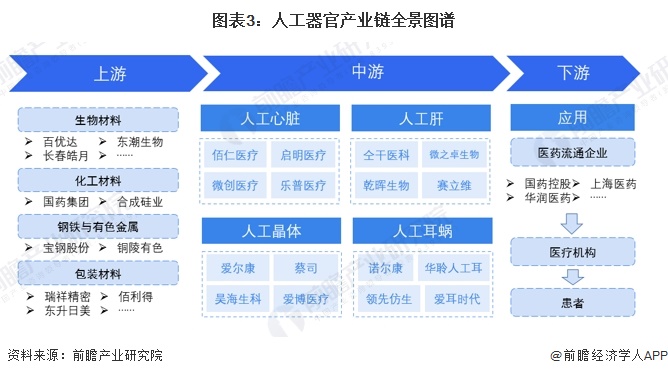
Industry development process: the early stage of industrialization
The earliest development of artificial organs can be traced back to the 1940s, with the continuous progress of science and technology, the research range of artificial organs from the initial artificial kidney, artificial heart to cochlear implant. With the success and failure of organ transplant operations, people began to realize the problem of donor shortage and rejection, which prompted scientists to search for new solutions.
Since the 1980s, the research and application of artificial organs have developed rapidly, and almost every organ in the human body is undergoing artificial simulation development, of which many artificial organs have been successfully used in clinical practice. By the 21st century, scientists using 3D printing technology and tissue engineering methods can customize artificial organs to meet the needs of specific patients, greatly improving the success rate of surgery and the quality of life of patients.
The research of China's artificial organ industry started late, and domestic products were mainly listed after 2010, such as the registration of China's first cochlear implant product in 2011, the listing of China's first artificial heart product - EVAHEART I in 2019, and the listing of the first domestic artificial lung in 2023.
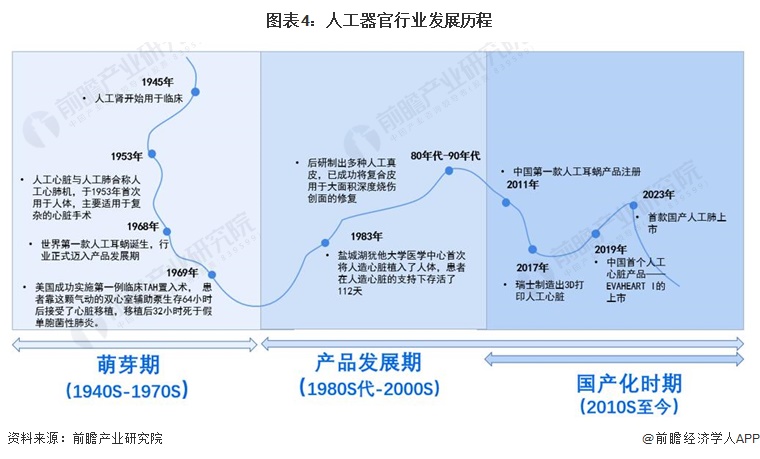
Industry policy background: The policy encourages the development of artificial organ industry
In recent years, the state has issued a series of policies to encourage the development of artificial organ industry, proposed to strengthen key core technology research, improve the level of industrialization technology and promote the industrialization and application of innovative drugs and high-end medical devices, accelerate the industrialization process of new products, and promote the promotion and application of innovative products.
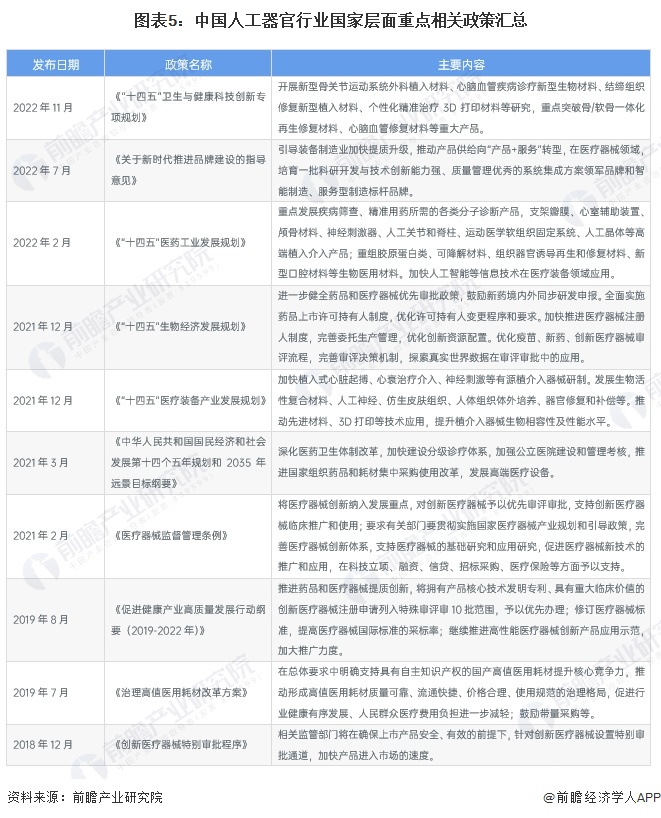
Industrial development status
1, artificial heart industry status
The artificial heart is a mechatronics device used to partially or completely replace the heart to complete the pumping function and maintain the blood circulation of the human body. Its core component is a blood pump, which leads the blood from the heart, elevates the pressure, and sends it to the aorta. At present, artificial hearts are divided into two categories, one is long-term implantable artificial hearts, including left ventricular assist devices, double heart assistance devices and total artificial hearts. The existing long-term implanted artificial heart products generally refer to the left ventricular assist device (LVAD), through the implantation of the device, instead of the left heart work, can greatly reduce the heart load, to achieve the effect of treating heart disease, such products are relatively expensive, the terminal price in the United States is 800 million to 1 million RMB, the total artificial heart has no widespread commercial products.
In 2019, China's first artificial heart, Chongqing Yongrenxin EVAHEARTⅠ, was launched, followed by Suzhou Tongxin CH-VAD in 2021, Aerospace Taixin HeartCon(Tianjin) in 2022, and Shenzhen Corheart6 in 2023. It fills the gap in clinical application of ventricular assist devices in China.
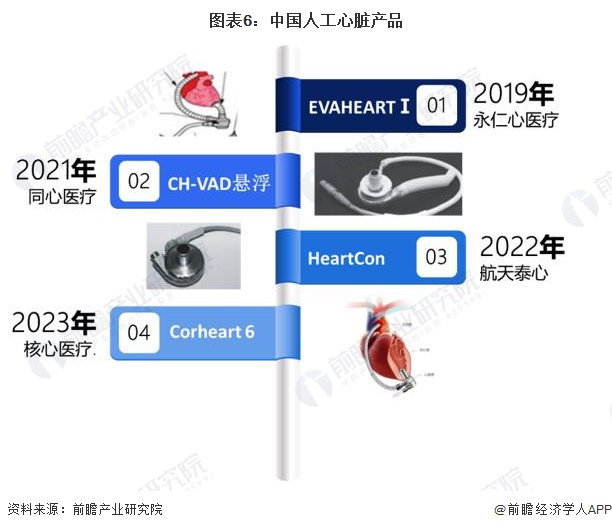
As of March 2023, a total of 363 cases of implantable ventricular assist devices have been completed in 70 hospitals across the country, of which the number of ventricular assist devices implantation has increased rapidly after 2021. From a nationwide perspective, 8 hospitals had more than 10 implants, 10 hospitals had 6-9 implants, and 42 hospitals had 1-5 implants. Overall, the application of implantable ventricular assist devices in China is still in its infancy, but it is developing rapidly.
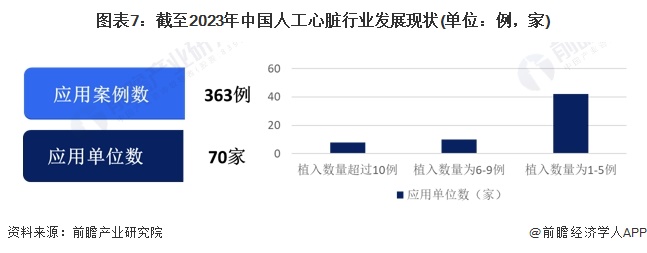
2. Current situation of artificial liver industry
As one of the important organs of the human body, the liver is also known as a "processing plant" because of its functions of synthesis, detoxification, metabolism, secretion, biological transformation and immune defense. When it is seriously damaged by a variety of factors (such as viruses, alcohol, drugs, etc.), it causes a large number of liver cells to necrosis, resulting in serious dysfunction or decompensation of the above functions, and then a group of clinical symptoms with coagulation mechanism disorders and jaundice, hepatic brain and ascites as the main manifestations, called liver failure.
Artificial liver is an effective treatment for liver failure in clinical practice. Artificial liver technology uses mechanical, physical, chemical and biological reaction devices to effectively remove the accumulation of harmful substances caused by liver failure, and at the same time supplement the proteins necessary for liver synthesis and metabolism, improve the electrolyte, acid-base imbalance and other conditions in the body of patients, and can temporarily assist or replace the corresponding functions of the liver. Until liver cell regeneration, liver function recovery, effectively improve the survival rate of patients with liver disease. There are three main types of artificial liver, namely biological artificial liver, non-biological artificial liver and mixed artificial liver. In the current artificial liver market, non-biological artificial liver mainly plays a detoxification function and is widely used in clinical practice to adapt to advanced liver failure. In addition to the detoxification function, biological and mixed artificial liver also has some synthetic and metabolic functions, and is currently in the stage of small-scale application, which is the potential direction of artificial liver development in the future.
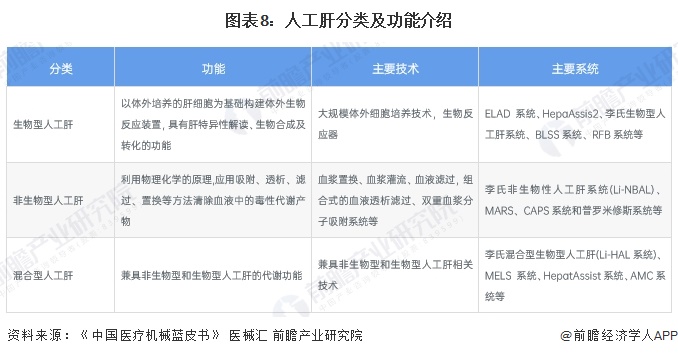
3. Intraocular lens industry status
In recent years, due to the increasing popularity of cataract surgery in China, the demand for intraocular lenses is also rising. According to the medical device Blue Book data, 2016-2022 China's intraocular lens market overall showed an upward trend, of which 2021 intraocular lens market size of 2.7 billion yuan, basically the same as 2020, mainly due to the impact of collection price reduction, market size growth slowed down. Preliminary statistics to 2023, the market size of about 3 billion yuan.
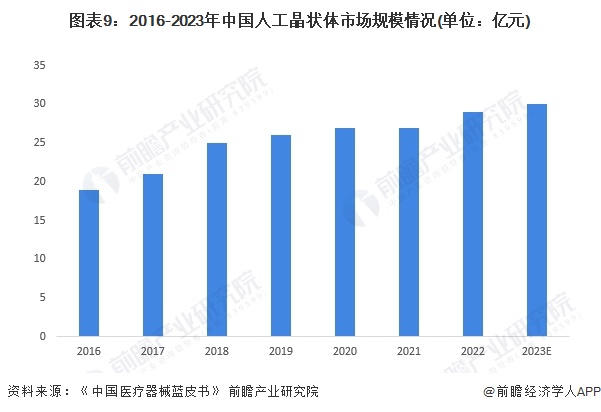
4. Status of cochlear implant industry
Hearing loss is one of the most common diseases in the world. At present, cochlear implants have become the standard treatment for severe and extremely severe neurological deafness. However, cochlear implants are expensive, and the current penetration rate is extremely low, and it is understood that the number of cochlear implant operations in 2022 will be about 13,000. According to Frost & Sullivan, China's cochlear implant market will reach 950 million yuan in 2022 and exceed 1 billion yuan in 2023.
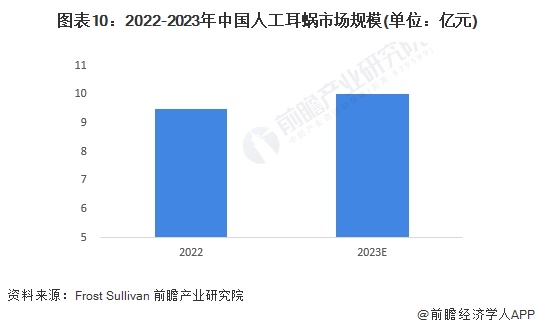
Industry competition pattern
1. Regional competition pattern: Shanghai artificial organ industry has the largest distribution of representative enterprises
From the perspective of the distribution of representative enterprises, the third-generation semiconductor representative enterprises in Jiangsu Province have the most distribution, such as Suzhou Nawei, Jingzhan Semiconductor, Inosech and so on. At the same time, there are more representative enterprises in Guangdong and Shandong.
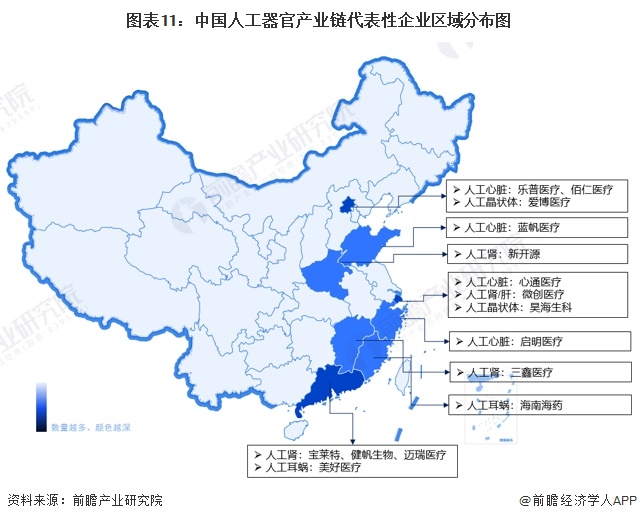
2, enterprise competition pattern: the rapid development of leading enterprises in various fields
From the perspective of the business layout of listed companies in China's artificial organ industry, in the field of artificial heart, Bairen Medical products cover three major fields: heart valve replacement and repair, congenital heart disease implantation interventional therapy and surgical soft tissue repair. Lanfan Medical, Lepu Medical and other companies regard heart valve business as a part of the group's diversified development in the large medical industry. In the field of artificial kidney/liver, Sanxin Medical is the first company in China to complete the full product chain layout of hemodialysis equipment + consumables, Baolet is the first A-share listed company to obtain the medical device registration certificate of hemodialysis machine, and Jianfan Biological's double plasma molecular adsorption system (DPMAS) pioneered A new artificial liver treatment model. In the field of intraocular lens, the representative listed companies are Aibo Medical and Haohaisheng, the former is the first high-end refractive intraocular lens manufacturer in China, and the latter has initially completed the layout of the whole industrial chain of intraocular lens products. In the field of cochlear implants, the company provides component and product development and production services for one of the leading companies in the global cochlear implant market segment.
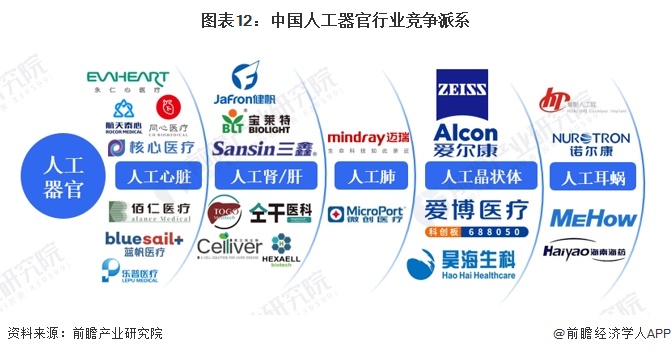
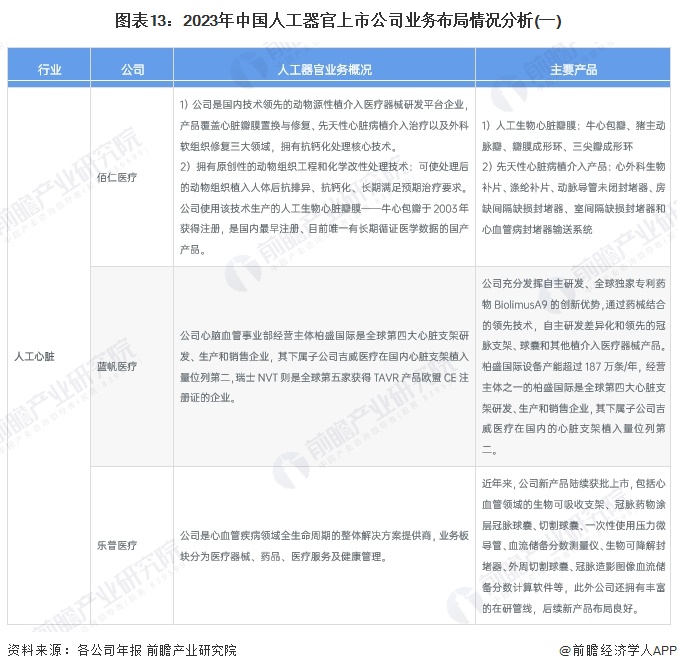
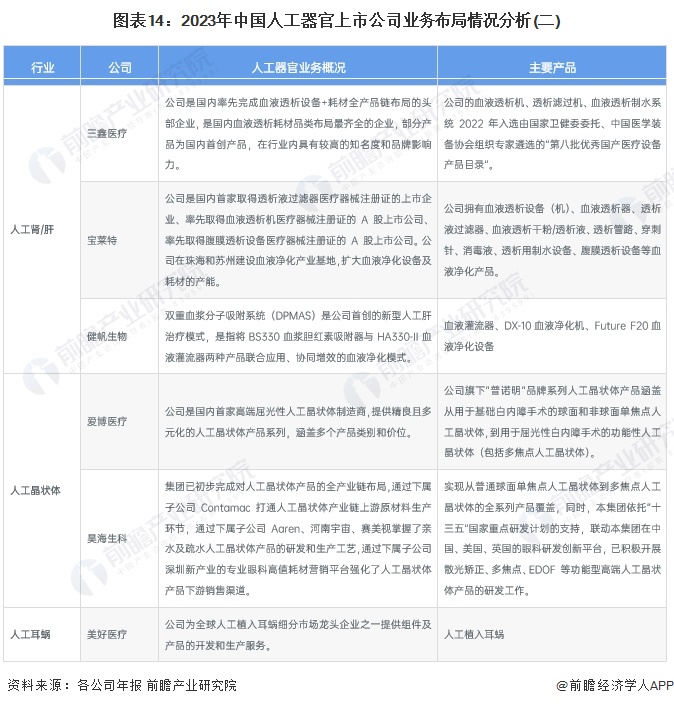
Industry development prospect trend analysis
Compared with developed countries, China's artificial organ industry has the characteristics of late start and small scale, but after the rapid development of recent decades, China's artificial organ industry has become a sunrise industry with increasing innovation ability and strong market demand. With the continuous deepening of national policy support and optimization, medical reform, aging population, consumption power and health awareness, China's artificial organ industry, especially the domestic artificial organ leading enterprises, has entered a golden period of development. In the domestic artificial organ market, with the favor of international medical giants with both capital and technological advantages, the industry competition is becoming increasingly fierce:
